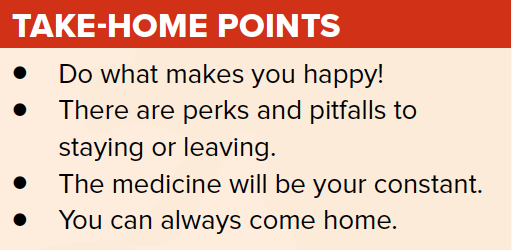Residency provides a built-in community, culture, and structure all its own. But as you look toward those early career years, how do you decide which practice environment is right for you?
The job hunt approaches. You are probably receiving advice from all over: Practice at a community site. Practice at an academic center. Go far away and create your own identity and practice patterns. Stay safe your first year out where plenty of consultants are available. Go where there aren’t any consultants to solidify your procedural knowledge and learn when to transfer.
But what will be best for you? It becomes a very personal decision, and one that only you can ultimately make.
 When it comes to staying put, it seems like an easy decision for many. You have had 3 or 4 years to develop relationships with the ED staff, consultants, the patient population, and your electronic medical record. You are comfortable. You are confident. Remember how stressful it was to start each new rotation as an MS3? Leaving the comfort of 3 or 4 years would exacerbate that feeling a hundredfold! It would be ideal to continue on a path you started a few years ago. Your significant other may have a job they love, your family may be settled – all the perks of never having to move again!
When it comes to staying put, it seems like an easy decision for many. You have had 3 or 4 years to develop relationships with the ED staff, consultants, the patient population, and your electronic medical record. You are comfortable. You are confident. Remember how stressful it was to start each new rotation as an MS3? Leaving the comfort of 3 or 4 years would exacerbate that feeling a hundredfold! It would be ideal to continue on a path you started a few years ago. Your significant other may have a job they love, your family may be settled – all the perks of never having to move again!
While it seems like an easy decision, there is more to consider. While you are comfortable in your role right now, the nurses, consultants, and the junior residents behind you are also comfortable with you in that position. They may not immediately see you as the attending, which can be stressful. Leaving may be a time to help you create an identity as an attending. Those in education leadership can tell many stories about the middle of the pack residents from their programs who have left and been some of the most successful docs at their new institutions. They can also tell stories about their star residents who go out and hate their new roles and come back.
Beyond comfort, staying at your home institution may limit your exposure to practice variation and diverse patient populations – many new grads will have spent the majority of their training explicitly at an academic center, while the majority of jobs are in the community. Were you at a tertiary care center that was on the receiving end of so many transfers? It may be a great opportunity to be on the shipping end to see how things are done with less resources.
Full disclosure. I am someone who stayed on where I trained with and have zero regrets. Only after 4+ years post residency have I moved on to a new institution. I attribute much of my success in my first year out to my former chair. He thought about what I would need as a new attending before he agreed to hire me. I was required to work the majority of my shifts away from residents at our 2 community sites where we had had little exposure in residency. I was taken out of my comfort zone the majority of the first year out to learn new systems, establish new relationships, and develop confidence in my practice patterns. I was also not allowed to take on “side jobs” (hospital committees, residency lectures, etc.) until I had taken my written boards. At the time I hated it, but looking back I can see that the shifts I worked with my former co-residents in the place where I had felt most comfortable were some of the hardest and darkest days of my first year out. My teaching evaluations said that I was “mean, angry all the time, not the same chief resident I remember, etc.” and looking back it was likely all related to the stressors I felt at being the ultimate decision-maker for so many complex and critically ill patients at a very busy trauma center.
So what do I recommend? I recommend doing what will make you happy!
When in doubt, remember most EM contracts are only for a year, and many of your future colleagues out there practicing have had more than one job out of residency! I conducted a very academic Twitter poll while working on this, and the majority of folks were happy and would not have changed their first job out of residency in both sides – those who stayed and those who left. So, be happy at home or take the leap and find happiness elsewhere! Either way, be kind to yourself in your first few weeks and months. Becoming an attending came with more emotional responsibility than I was expecting. Do not be afraid to ask for help. You will never truly be on your own in the practice of emergency medicine. All of your co-residents, those who trained you, and those who are your senior colleagues at your new institution will be there to help.
No matter where you end up – just remember: the medicine will be your constant! If you ever feel lost, just remember that your home residency institution will always be that, home. And you can always go home.



